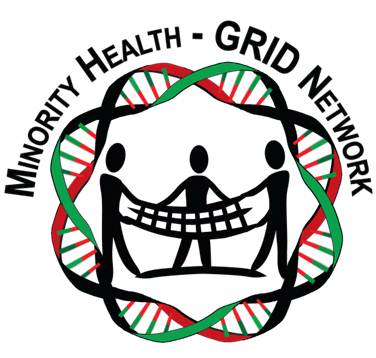 The Minority Health Genomics and Translational Research Bio-Repository Database (MH-GRID) Network is the first of its kind to focus primarily on minority patients, to build a database of genetic and other health information from minority populations by bringing together a collaborating web of institutions, hospitals and community clinics that will share information derived from electronic health records. The effort will begin in the Southeast, known to have the highest incidence of high blood pressure and stroke among African-Americans.
The Minority Health Genomics and Translational Research Bio-Repository Database (MH-GRID) Network is the first of its kind to focus primarily on minority patients, to build a database of genetic and other health information from minority populations by bringing together a collaborating web of institutions, hospitals and community clinics that will share information derived from electronic health records. The effort will begin in the Southeast, known to have the highest incidence of high blood pressure and stroke among African-Americans.
The initial objective is to use this database to learn more about why minority patients suffer a more virulent clinical course of hypertension and its complications, such as stroke. Investigators plan to extend these studies to other conditions that disproportionally affect African-Americans. The database will allow long term study and short term action in finding new, more effective methods of treatment and prevention. It will also allow scientists and health care workers to delve more deeply into the genetic, social and economic factors connected to this disease and overall health.
While serving as Principal Investigator, Dr. Gary Gibbons, former Chairman of the Department of Physiology and Director, Cardiovascular Research Institute, Morehouse School of Medicine stated, "The persistence of health disparities in medically underserved minority communities remains one of the most vexing public health problems facing our nation". Appointed PI with the transition of Dr. Gibbons to NHLBI, Dr. Rakale Quarells continues to promote the pursuit of eliminating health and medical treatment disparities in the minority community.
Dr. Quarells continues to lead an outstanding multi-disciplinary team of scientists with expertise in health disparities research, genomic science, bioinformatics, bioethics, epidemiology, minority community outreach, behavioral science and cardiovascular medicine. Although the Minority Health GRID has an initial focus on tracking health outcomes at safety-net clinics and hospitals in the Southeastern United States, the team includes a variety of collaborative institutions from the NIH, Emory University, University of Washington, Jackson State University, Baylor College of Medicine, the Jackson Heart Study, Jackson-Hinds Clinic and Stanford University. The study will use the latest DNA sequencing technology to create one of the largest existing 'catalogues' of detailed DNA sequence information of African-American patients.
The long-term objective of the Minority Health GRID project is to develop more sophisticated approaches to 'personalized medicine' that are applicable across the diverse spectrum of patient populations in the United States. The MH-GRID intends to develop predictive tools that will allow clinicians to identify at-risk patients with hypertension who are most likely to benefit from interventions designed to prevent complications such as stroke, heart failure or kidney failure. The project is among the first in the nation with a specific focus on applying state-of-the art technology and multi-level approaches that will facilitate the ability of the clinician to capture genetic, social and environmental factors that influence the course of disease.
